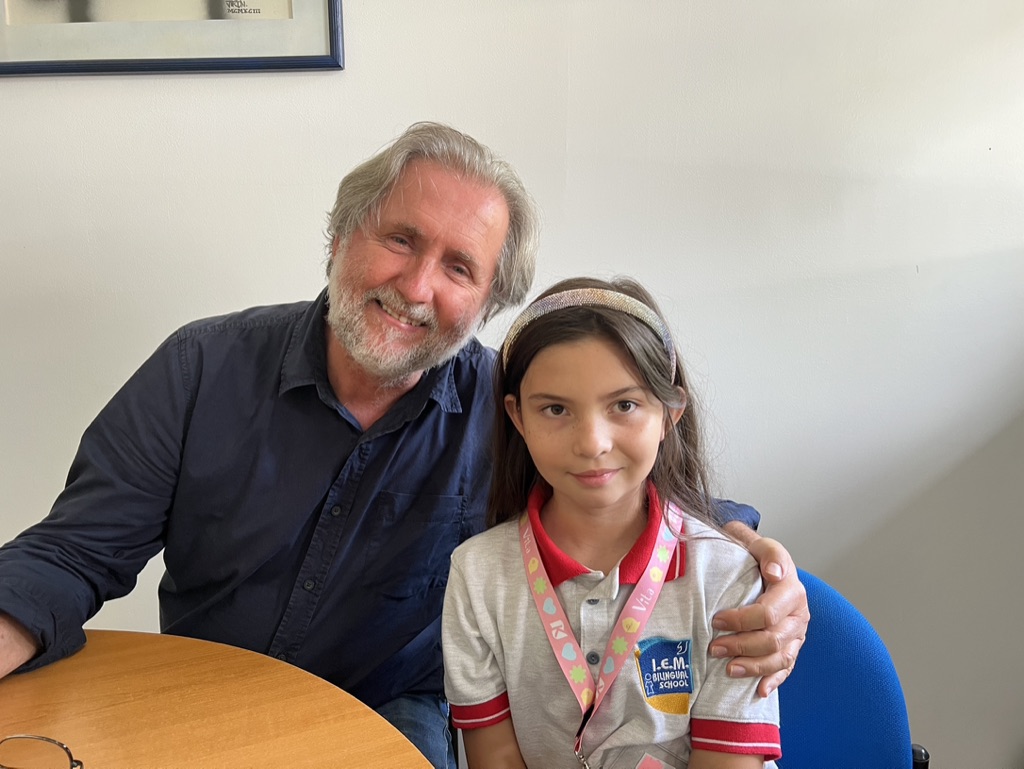One day, I sat with my dear teacher. His name is Fernando Thiel, but we all call him Profe Loco, or “Crazy Teacher.” He is a theater teacher at the Instituto Educativo Moderno (IEM), which, according to the professor, is the only school in Costa Rica where theater is included in the curriculum.
This year, I went to see his play “Y ahora ¿a qué jugamos?” (“Now what should we play?”) at Teatro Espressivo, Momentum Pinares, Curridabat. I wanted to ask him about some things I saw in his work.
He is a famous writer in Costa RIca who creates interactive works for boys and girls of all ages. In addition to being a teacher, he is a psychologist, playwright, producer, and actor. I have seen several plays and I had a lot of fun. He also does a lot of things with puppets, and his puppet plays are always very interesting. You can see them at the Teatro de Bolsillo, San Pedro.
We talk about his work, his morals, and where he gets his ideas. Excerpts follow.
I know that many times, you put morals in your work.
Others sometimes call it giving advice—and that’s not it. I don’t give advice. What I do is help boys and girls to think, to reflect. To understand that it is not black or white, but rather gray. It means that everyone draws their own conclusions. It’s not moral, but I offer ideas so that people can draw their own conclusions.
But what comes first? Are you usually thinking, “Kids should know this,” or are you thinking of a bunch of characters up there in your head?
Regarding the characters, I get all that from—do you know who? From you all. From boys and girls in theater classes. They give me ideas. Many of the things you see in plays are ideas that children give me. I have a lot of fun, I play, and I laugh over the things what you do.
Except boys, who only think about soccer these days.
You are right. And not just men—women, too. Lately, the entire culture has focused on nothing more than football and video games. That is why this idea came from to do the play “Y ahora ¿a qué jugamos?” That child who is stuck in the garage [because of a power outage in the play] is because I have seen many children locked in the garages in the neighborhoods, and one time a girl cried and told me, “My mother left, and the power went out, and I was locked in.” And then that prompted me to write that. And [the character of] Federico is called Federico because that’s the name of my younger brother who died, and I named Paul after my youngest daughter—and there is Sofia, who is the other oldest daughter. Everything has a historical relationship.
Why did you start in theater?
I started in theater because my family was a little crazy.
Mine, too.
My grandfather was a tailor… but my grandfather also played the violin, sang, and acted with his brother, who also told jokes in the villages. I also had an aunt who was a singer. They were all German Austrians; they were immigrants [to Argentina]. My dad started doing puppets, in addition to being a lawyer and being a teacher, and my uncle had a theater called the Art Theater. He traveled all over the world and directed many works, made films.
When I was seven years old, my dad brought out his puppets. There were little ones that he made and he passed them to me. From there, I caught the bug…. I love the tricks [we do with the puppets. In a puppet play we did for you students], when exhaust comes out of the car—what was it?
I think it was talcum powder.
You’re right! I blow talcum powder and it looks like smoke. I love doing those pranks. It’s child’s play. When I was seven years old I started doing theater and playing, and I still play, even though I am 59 years old.
Once I caught the bug, and I went to the theater a lot. They always made me perform in school. And you know what? It made me so nervous that I got diarrhea. I had to run out before the play started! Still, even today I get nervous.
Just like me. Today, I had to give a presentation to my class.
And did it make you nervous?
Yes. Especially when I had to read a story in front of the class.
I try not to make you guys nervous about that in theater classes. I make sure you’re free to create your own characters, to create your own text. Why? Because if I give you a text that is written by adults, sometimes we include words that kids do not understand. Instead, you kids put it in your own words.
[Psychologist Lev] Vygotsky says… that everyone has their own knowledge, and what you have to do is take advantage of your knowledge, take it to the next level. That’s what I did with the play. I take your knowledge and take it further.
That make sense. Once I was at a play for adults, but I didn’t understand anything because they said very sophisticated words.
Of course. How do you teach children to love trees? Telling them to hug it, to put their ear up to one, to see what the trees are telling us. Seeing what kids will come up with and what they’ll hear from the trees. You can say, “Don’t kill animals,” but if you hang out with animals, pat them, feed them, take care of them, that’s where you’ll start to love animals or nature. Adults give advice all the time, but we get nowhere.
That’s why advice books don’t work. If they did, everyone would be happy and doing well… You have to learn to love things first to be able to take care of them.
Is there something I didn’t ask you that you want to say?
What I want to say is that I’m still a child. I like to have fun, even though I’m an adult. I get so much from you, the kids. Many ask, “Why are you still teaching theater classes?” and it’s all because you give me life. You give me energy. I don’t think I’m going to retire, because I’m going to continue having fun and drawing on the energy that you give me.
And I love that you interviewed me, because very few kids interview me. It is always journalists or adults who ask me questions, but very rarely do kids ask things about my life.
That makes sense, though, because we haven’t graduated or anything like that.
But do you know something? You graduated from life. You’re all full of life and joy. There is no school for that.
Our Young Writer and Kid Reporter initiatives help young people improve their writing and English skills as they build confidence and learn about the power of solutions journalism to bring about positive change. If you’re interested in journalism activities for your classroom, contact us at [email protected].






